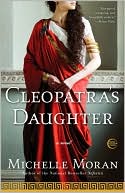 Told from the point of view of Cleopatra Selene, the only daughter of Cleopatra and Marc Antony, Moran’s latest historical novel gives an interesting glimpse into the life of a young Egyptian woman as she learns to make her way in Rome. Octavian (Caesar Augustus) kills the majority of her family, yet he brings Selene and her brother Alexander to Rome to live in the house of his sister. Spurned by their father, Octavia, takes in the children and raises them with unexpected compassion and kindness. After Selene and her brother are paraded around Rome as slaves, they are then taken in as part of the emperor’s family – attending school and activities with Caesar’s daughter Julia and Octavia’s son Marcellus. Outspoken, Selene may enjoy the company of Marcellus, but she makes no secret of the fact that she will do whatever she can to get back to Alexandria.
Told from the point of view of Cleopatra Selene, the only daughter of Cleopatra and Marc Antony, Moran’s latest historical novel gives an interesting glimpse into the life of a young Egyptian woman as she learns to make her way in Rome. Octavian (Caesar Augustus) kills the majority of her family, yet he brings Selene and her brother Alexander to Rome to live in the house of his sister. Spurned by their father, Octavia, takes in the children and raises them with unexpected compassion and kindness. After Selene and her brother are paraded around Rome as slaves, they are then taken in as part of the emperor’s family – attending school and activities with Caesar’s daughter Julia and Octavia’s son Marcellus. Outspoken, Selene may enjoy the company of Marcellus, but she makes no secret of the fact that she will do whatever she can to get back to Alexandria.
Ancient Rome is not as popular as some time periods, say Victorian England, in historical fiction, but Moran does a great job of bringing that world to life. I tend to think of figures from that time as marble statues, so it is wonderful to hear characters like Caesar Augustus and his right hand man Agrippa speak and express emotions. Seeing the world from Selene’s point of view provides an interesting perspective on a place that is so ingrained in our minds as a seat of culture. Selene is horrified at how uncivilized it seems compared to Alexandria.
My favorite character was Juba who had accomplished so much even though he was only a young man. He is fluent in several languages and in addition to his duties to Caesar, he is a noted scholar of antiquities. He acts as a body-guard to Caesar and occasionally to Selene. As another conquered subject, he tries to provide an example to her of how she can survive in Rome. There is a great tension between the two and I only wish that their relationship was a little more developed.
(This review refers to the audiobook version of Cleopatra’s Daughter downloaded via Overdrive.)



Since you say you tended to think of people from this era as marble statues, I’m guessing that maybe you have never seen the Masterpiece Theatre version of “I, Claudius”, or read Robert Graves’ novels from which the series was drawn. The series was probably before your time. Having seen it, and read the books, I very much think of these people as real and interesting (if sometimes foul) and vivid characters. My only problem with “I, Claudius” was the brutality, which is probably historically accurate, but horrendous in places all the same. I think I would enjoy reading “Cleopatra’s Daughter” for another account of Ancient Rome and the emperors, and particularly for one told from outsider’s perspective. And now I want to know more about Alexandria and why Selene found it more civilized.
I really liked this one when I read it last year too, but you are right, the ending seemed very rushed, especially the relationship.
I never did see “I, Claudius” though someone did recommend the books to me. They have been on my list for a while. There is certainly some brutality in Cleopatra’s Daughter as well. It’s hard to believe the things Caesar Augustus did. You couldn’t look at him the wrong way!